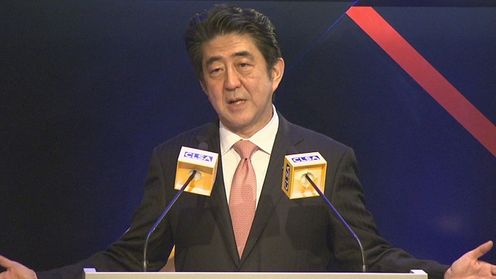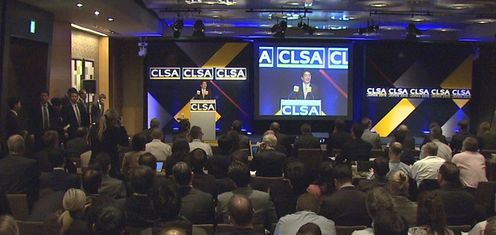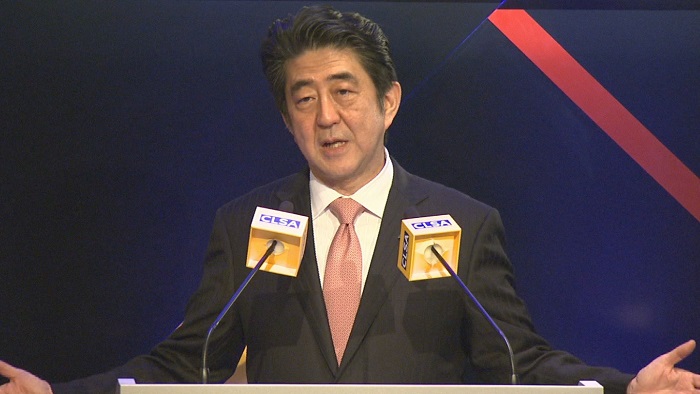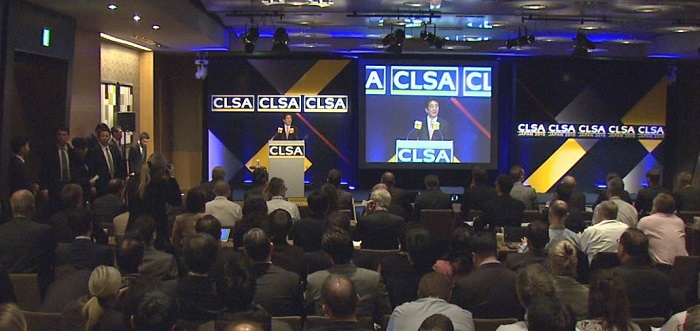Home > News > The Prime Minister in Action > February 2015 > CLSA Japan Forum 2015
The Prime Minister in Action
CLSA Japan Forum 2015
February 24, 2015

Photograph of the Prime Minister making a speech (1)

Photograph of the Prime Minister making a speech (2)
[Provisional Translation]
Prime Minister Shinzo Abe attended the CSLA Japan Forum 2015 held in Tokyo.
The Prime Minister said in his speech,
“Congratulations on the opening of the CLSA Japan Forum. Last year I participated via a video message, but this year I am very honored to have the opportunity to speak here in front of you all.
In last year’s video message, I said that the Japanese economy was undergoing tremendous change, from ‘minus’ to ‘plus,’ from ‘giving up’ to ‘hoping,’ and from ‘sunset’ to ‘daybreak.’ Over the past year, these changes have become more firmly established.
And now, we are stepping forwards into a new stage.
Last week, the Nikkei Stock Average surpassed the high value of 18,000 yen. Since I initially took office in 2007, this is the first time a figure greater than 18,000 yen has been posted.
Accordingly, moving forward, we will be entering a zone where I too have no experience. And for that reason, we must advance even greater reform. I am resolved to let loose the ‘three arrows’ with even greater force.
It is not possible to deal with the deflation that has been continuing on for approximately 15 years through conventional means. ‘Will Abenomics really move forwards or not?’ For some time after I returned to power, businesspeople continued to feel anxious, and defensive management practices continued to be practiced. That is true. However, our businesses have begun to proactively apply a record amount of cash reserves, which perhaps is a result of those defensive management practices, to their capital investments, corporate acquisitions, and other business areas. Businesses have started to change course toward more aggressive management practices, and have begun to move toward investments for further growth. They are also working on raising wages, and dividends for stock holders have grown large as well.
The Government as well must not yield.
Starting this April, we will lower the effective corporate tax rate by 2.5%. After one year, the extent of that tax cut will be increased to at least 3.3%, and we are aiming to implement even further reforms. We will reduce the current rate to the 20-29 percent range over the next few years, advancing corporate tax reforms that will bring taxation to levels that compare favorably in international terms. We are shifting gears and orienting the minds of Japan’s managers toward growth.
We are resolved to tackle the many reforms which before seemed unfathomable, thereby pioneering new market frontiers.
During this session of the Diet, we will submit over 20 pieces of legislation for the Growth Strategy, including bills that will strongly advance the reform of vested interests such as agriculture, medicine, employment and energy. Under no circumstances will we will go back on these reforms, and neither will they become watered-down. The fresh ideas of the new players entering the market will promote a chemical change in industry. The product of this reform of vested interests will be the creation of businesses that could not have even been imagined 10 or even five years ago, one after the other.
In the field of energy, we have realized the full liberalization of the electricity retail market, which had been monopolized for approximately 60 years. Since the change in Government, there are now approximately double the number of operators running electricity retail businesses.
Electric power system reforms will soon be entering their final stages. The distribution and transmission networks that are a fundamental part of the energy market infrastructure will be separated from power generation and retail power, allowing fair access for all. The retail gas business will similarly be fully liberalized, thus eliminating all barriers to market entry. I will work to create a competitive and dynamic energy market in which venture companies and foreign companies participate and compete using new technology and business models.
At the same time, we are aiming to be the front runner in the energy revolution. Through the regulatory reforms of the Abe Cabinet, the first steps were made towards the dream of a hydrogen-based society. Last year, Japan went ahead of the world and commercialized fuel-cell vehicles and hydrogen stations. I have test driven a fuel-cell vehicle myself. These vehicles emit no gas, only water. They are quiet and pleasant to drive. They are truly dream vehicles. Next, we will realize self-service hydrogen stations through regulatory reform and make fuel-cell vehicles a much greater part of the daily lives of the public.
We will carry out the first reforms of the Agricultural Cooperatives, something that has been too taboo to even speak about up until now. This is the first such reform in 60 years. We are aiming for global markets. The global food market extends to around 340 trillion yen in overall scale. We will advance integrated reforms in Japan and overseas and work to bring safe and delicious Japanese produce and food culture to the world.
It has honestly been difficult to convince those who object to reform. In many cases, it has been the people who have passionately supported us in the Liberal Democratic Party (LDP) up to this point who have been the ones worrying about the impacts of these reforms. However, without competition, they too have no future . For these supporters especially, we will continue our unfailing efforts for reform.
Economic activities have erased national borders. Any company that cannot be internationally competitive cannot hope to survive. We will advance domestic structural reforms and simultaneously launch Japan into a wider economic zone through economic partnerships like the Trans-Pacific Partnership (TPP). Comprehensively promoting reforms at home and abroad is essential to enhance Japan’s competitiveness.
The Japanese economy is spreading its wings across the globe and is beginning to show signs of a new kind of growth. Real GDP in the fourth quarter last year grew 2.2% on the same period in the previous year, while our GNI, which includes income earned overseas, grew tremendously at an annual rate of 6.9%.
The TPP will create a single economic zone in the Asia-Pacific region, the world’s growth center. It will give birth to an enormous market in which we will see thoroughly liberal and fair new rules applied to a wide range of fields – not only tariffs – but also the reform of state-owned enterprises, investments, and intellectual property.
We are in the final phase of TPP negotiations. I understand well that that the final inch of negotiations is the hardest. However, if we can realize this chance, I believe that Japan’s access to the open world will be greatly expanded. And I expect that all of you in business will not flinch but step forward into that new world. I myself will exercise strong leadership and exert every effort toward the early conclusion of negotiations. We will secure the national interests of Japan and ensure growth.
Japanese corporations are not the only ones who invest in Japan. We are greatly increasing the attractiveness of Japan as an investment destination. During the era of the previous administration, in FY2011, research into the level of interest held by foreign corporations in investment destinations within Asia showed that China held the lead in all categories. However, by FY2013, Japan had taken the lead as an R&D and retail center. Viewed from the perspective of those outside of Japan as well, we can see results like those from the World Economic Forum. Its index to measure competitiveness showed Japan to be in tenth place in 2012, also during the previous administration. Yet in 2014, Japan moved up to sixth place. The competitiveness of Japan as an investment destination is steadily improving.
In April, using the National Strategic Special Zone system, we opened a one-stop center for individuals setting up new companies which promptly handles procedures, including those for registration, taxes, and pension. I believe that foreign corporations setting up businesses in Japan as well will be able to feel how friendly the administration is.
The amount of direct investment offered to Japan is growing. In 2014, it was more than double what it was the previous year.
This March, I want to partner with governors and mayors across the country and compile new initiatives to encourage foreign corporations considering overseas investments to choose Japan, as a country regaining its past glory.
To that end, I want to establish a ‘Corporate Advisory System’ that will assign state ministers and parliamentary secretaries as consultants for companies receiving important investments from overseas. In addition, we will create an environment in which regional airports can accept business jets in order to make it easier for companies to set up their headquarters and research centers in Japan. Furthermore, I want to see the development of new innovations to increase the convenience of Japan, including efforts to make retail shops, restaurants, and hospitals multi-lingual so that people from overseas can live in Japan with peace of mind.
In the two years since I assumed office, I have already visited 54 countries and regions. Additionally, Japanese corporations are starting to become more engaged with the world. Last year, through proactive economic diplomacy, we greatly increased the number of orders for infrastructure projects received by Japanese corporations by three times the previous number, up to a total of 9 trillion yen.
No longer is the mindset of the Japanese people inward-looking, as it was in the time before Abenomics. Japan has become more open for those both inside and outside the country.
Japan is ready to accelerate forward full-throttle this year. How could you choose not to invest in such a country? I hope that all the investors here will take this opportunity to feel for themselves how the Japanese economy is being reborn, and that you will all please consider Japan as a prominent investment destination. Thank you very much.”


